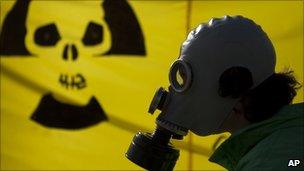Germany: Ill winds blow Angela Merkel's party away
- Published

Anger at nuclear policy drew 200,000 on to Germany's streets on Saturday
It's hard to put your finger on one factor that undoes a political party at an election.
Often it's something vague and hard to define.
But the defeated Christian Democrat leader of Baden-Wuerttemberg, Stefan Mappus tried. "The horrible pictures from Japan and the horrible events in Japan was the main issue over the last two weeks," he said.
And the mass circulation Bild draws the same conclusion. Monday morning's paper (the morning after the election night before) has a big green headline dominating its front page: "Green beams," it says - or "radiate" in this context, as in radiate joy, alluding to what the paper calls the Nuclear Election.
Anti-nuclear power
And so it was. Like no other European country - like no other country anywhere - Germany has a strong anti-nuclear movement. Way before the events in Japan, tens of thousands of protesters massed in November last year to try to stop the transportation of nuclear waste to a processing site.

The Greens were likely to win their first premiership of a German state
There have been huge demonstrations since the late 1970s against nuclear power in Germany. The reasons are complex and debateable.
It's certainly true that radioactive air from Chernobyl reached Germany - but then it also contaminated much of the rest of Western Europe. Sheep farming in Britain was damaged but there is no anti-nuclear movement there to compare with the German one in size.
The German movement evolved from the radicalism of the 60s where, in divided and conquered Germany, the sentiments were different from elsewhere.
The radicals of that German generation of '68 who were the children of the war generation reacted, often violently, against a raft of perceived wrongs: the guilt of their parents and the Federal Republic's failure to punish many of the guilty who got good jobs as judges and bureaucrats; the Americans in Vietnam (whom some came to see also as the occupiers of the Western half of Germany itself); and capitalism.
As times moved on, that anger became channelled into the anti-nuclear cause which, for many, now encapsulates big business.
So when Japan happened, the cries of "I told you so" were very loud indeed.
'Winds from Berlin'
"There was no other campaign topic," said Stefan Mappus, the defeated head of the CDU in Baden-Wuerttemberg. But then he added intriguingly: "And the winds from Berlin were also blowing against us."

Christian Democrat Stefan Mappus had little doubt about the reason for defeat
By "winds from Berlin", he may have meant a general sense of unease at Chancellor Angela Merkel's stance on a string of issues.
She changed policy on nuclear power two weeks ago by putting the policy she had insisted on six months earlier into review.
On the euro, her critics say she's talked tough about bail-outs but agreed to mechanisms to let them happen.
Bild newspaper has taken issue with her on that, and it is not a foe that a chancellor to the right of centre would want.
On the other side of this argument, people in her own party argue that she should come out fighting for the euro, on their side, by pointing out that it has benefited German exporters greatly.
Libya reticence
On top of that, she declined to get involved in Libya, much to the annoyance of some in Germany's foreign ministry.
Germany has been hammering hard at the door of the United Nations Security Council, seeking a permanent place and promising to shoulder a greater international burden in return.
All of this adds up to a sense, according to Mrs Merkel's critics - even her friendly ones - of a government being overly moved by the immediate winds of politics, rather than the long-term needs of policy.
One of her own ministers was quoted in leaked minutes of a meeting as saying that the sudden U-turn on nuclear power was based on electoral politics and was "not rational" - though he later said that the leaked minutes were not an accurate representation of what he had said.
So nobody thinks this is a government riding the crest of a wave of adulation. The old "Teflon" chancellor is not bestriding the land.
Mrs Merkel doesn't have to hold a federal election until 2013, but may be forced to call one earlier.
Is there a lesson for governments in other countries? It's probably that there is a general sense of unease among voters. Talking to people in Baden-Wuerttemberg before the election, they kept saying that they felt that big business interests were riding roughshod over them.
In Stuttgart, for example, there's a multi-billion-euro project to redevelop the station and build a high-speed railway line linking East and West Europe. It has generated enormous opposition because - so people told the BBC - they felt that their wishes were being squashed.
On top of this, there's a general sense of dislocation because of the economic turmoil, which in Germany is compounded by a feeling that German taxpayers are paying for others' profligacy.
What to make of all this? One analysis might be this; if people feel ignored and unfairly treated, normal politics cease to apply. They react against those in charge. They change usual allegiances.
Mrs Merkel may hope the economy strengthens her ratings. The difficulty in that hope is that Baden-Wuerttemberg is the most prosperous part of Germany - and the voters there showed little gratitude to the party of government for that.
- Published26 March 2011
- Published22 March 2011
- Published17 March 2011
- Published15 March 2011
- Published17 October 2010